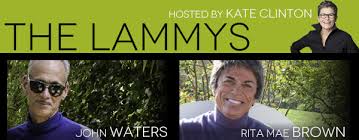Winners of The 27th LAMBDA Literary Awards will be announced Monday in New York City. The night is a celebration of the best lesbian, gay, bisexual, and transgender books of the year. It is a gala that some authors say rivals the Oscars. John Waters and Gloria Steinem will be there. And they’re in good company with two western Mass., authors whose books are nominated: M.B. Caschetta’s book Miracle Girls is nominated for Lesbian Fiction, and Judith Frank’s All I Love And Know, landed in the category of Gay Male books. They’re up against notable writers, straight and gay. And their books feature straight and gay characters. So why identify them as LGBT fiction?
“We keep the category to celebrate ourselves and to pay tribute to our long and rich history,” Caschetta says. But she adds authors also hope “that the category goes away in the minds of a wider readership.”
“It’s all in the marketing.”
“Miracle Girls” is about a town in upstate New York town in 1973 where children keep disappearing, and about a gay Catholic boy who lives in a world where he believes himself to be more loved, a child of God, Caschetta says, “because he’s gay.” 
Frank’s book is about a gay couple, Daniel and Matt, who live in Northampton. The story opens with the news that Daniel’s twin brother and sister in law are killed in cafe bombing, in Jerusalem. The Israeli children come to live with the couple in Massachusetts. 
Frank is a gay novelist first, she says, and she’s dedicated to her gay readers, but she also wants to write for anyone who wants to read a good book about being Jewish in America, Middle East politics, and about family.
Her editor on “All I Love and Know” also happened to be gay. She says he went to great lengths to market her book to a wider audience. It wasn’t just the publishing house pushing Frank for to find wider readership. She says her partner kept telling her — the audience is Aunt Anne from in Kansas City.
“Aunt Anne is a straight woman. She’s well educated and open minded, and is not a reader of gay books, necessarily,” Franks Says. Her partner kept kept saying to her “that’s your audience, it has to be readable by Aunt Anne.”
Book categories — be they on bookshelves or awards — are beginning to blur, no doubt the result of changes that extend well beyond Northampton, independent and large books stores, and major online booksellers. Since Massachusetts legalized same sex marriage in 2004, the courts and public opinion have shifted. So are novels and memoirs with gay characters gay books or just books? The writer David Leavitt said in the New York Times ten years ago, “the revolutionary thing to do is to retire the [gay literature ] category altogether.” Can books, at least, step into a “post-gay future?”
Caschetta and Frank go back and forth on this, and in the last year something very mainstream happened for both of them. They were blurbed, separately, in People magazine. Caschetta says she stunned to land in the same issue, on the same page as Stephen King. Frank says any writer is shocked to see themselves in People.
“I can’t think of many gay books I’ve seen in People magazine. But that’s part of the point,” Frank says. “I don’t think anymore, oh hey, that’s a gay book.”
In recent years, the LAMBDA awards too have received more mainstream media coverage, in Entertainment Weekly and The New York Times. M.B. Caschetta says, and Judith Frank agrees, publishers and readers may have come to a point where gay and lesbian writing is becoming recognized for what it is, book by book.
